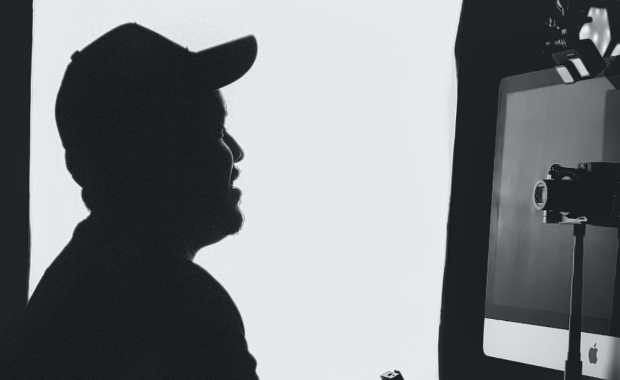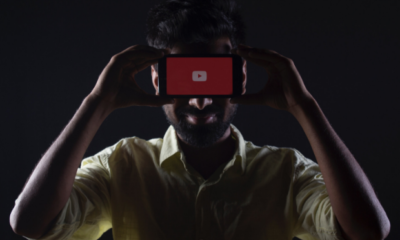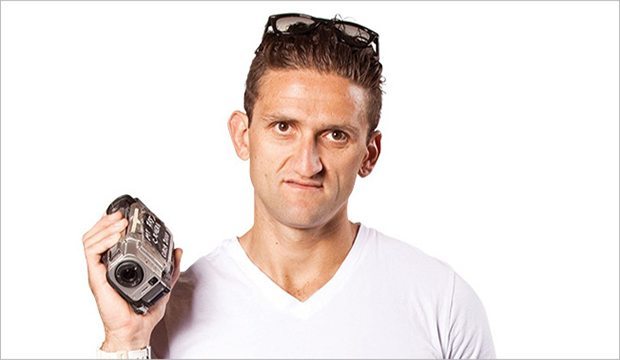Life
3 Life Changing Lessons I Learned from Starting a YouTube Channel

Like me, many of you have YouTube channels that are sitting around collecting dust because we just didn’t know what to do with them. Afterall, being a content creator and YouTuber is hard work and it can amplify all this is good or bad in your life. My channel has been around since 2008 but I didn’t know anything about sharing a message because I didn’t think I had one. But once I started to go all-in on my channel, I started to learn a few hard, but necessary lessons about what it takes to grow into the kind of person who has a successful business and channel.
The process of content creation can reveal a lot about a person and how they view the world. So it’s no surprise that really starting a YouTube channel challenged me and my low self-esteem. After all, what was my message? Why would anyone care to watch me?
Here are three of the lessons I learned from going all-in on my YouTube channel:
1. It’s not about me
This is one of the hardest lessons in life for people to learn. I’m one of those people. Perfectionism and other variations on anxiety would have us think the success of our content, in whatever form, is about us, the creator. It’s really not. While content may be the way we express our message, we are the messenger, not the message. By taking the message off of myself, I am better able to answer viewer questions and truly provide the kind of content people are searching for online.
“Content that serves is content that sells.” – Marie Forleo
2. No one cares who I am
This lesson hurt deeply, I’m not going to lie. We live in a very self-centered society where voyeurism and reality would have us believe that our everyday lives are interesting enough to build a successful business. The harsh reality is that no one knows who I am and I’m not famous enough for anyone to really care what I do on a daily basis. That’s why new YouTubers with vlogs and bloggers with lifestyle blogs find it hard to gain success faster than other content creators. Consumers are online to find solutions to their problems. Yes, they want to be entertained as well, but you’ve got to solve their problems.
Many famous YouTubers with vlogs or those with reality TV shows are people with some kind of influencer or celebrity status already. There is something truly unique about them which draws in the audience. They didn’t start that way though. These people started by building a brand around one thing they were good at and serving one audience really well. Only after you’ve done all of that do you get the privilege of talking about whatever you like and have people actually care about what you had for breakfast or what you eat in a day.
When you create that video about reviewing the latest product my audience is searching for information about, I understand they may not know me, but they know the product. By leveraging the name recognition of the product I’m reviewing or the celebrity I’m about to disagree with or book I’m going to review, I create a win-win situation. I get the views (and maybe subscribers) and they get answers to their questions. Everyone is happy.
3. Serve the audience
The final piece of the puzzle is likely the most important. As I’ve said before, no one really cares about me because they don’t know me. It’s not because I’m not a person of worth, it’s just that the viewer has a problem and they are looking for a solution, not my musings on the latest Nike shoes or the shenanigans of my dog.
As content creators and business owners, we have to remember that our job is to serve. If we aren’t offering a solution to someone’s problem, what are we doing? YouTube is a search engine and people are looking for answers to specific questions. By providing those answers, you can increase the opportunity for them to get to know you, like you, trust you, and then buy from you.
“We need to stop interrupting what people are interested in and be what people are interested in.” – Craig Davis
Serving the audience is really about looking outside of yourself and not creating selfish content. It is not my job to create content I want to see, but rather create the content that my audience is looking for. What keeps them up at night? Why are they online searching for answers? Certainly I can weave in my story and message within those answers, but the content must first and foremost serve the audience. Without an audience you are just shouting in a vacuum.
And while I’ve had to refocus my YouTube channel many times, the only reason I haven’t been consistent in content production over the last 4 years is because I took the focus off of the audience and put it on me. While I would love to have a successful business and have my YouTube channel be a part of that equation, I have to remember to serve first.
Did You Know
How Skilled Migrants Are Building Successful Careers After Moving Countries
Behind every successful skilled migrant career is a mix of resilience, strategy, and navigating systems built for locals.

Moving to a new country for work is exciting, but it can also be unnerving. Skilled migrants leave behind familiar systems, networks, and support to pursue better job opportunities and a better future for their families. (more…)
Life
10 Research-Backed Steps to Create Real Change This New Year
This New Year could finally be the one where you break old patterns and create real, lasting change.

Every New Year, we make plans and set goals, but often repeat old patterns. (more…)
Life
9 Harsh Truths Every Young Man Must Face to Succeed in the Modern World
Before chasing success, every young man needs to face these 9 brutal realities shaping masculinity in the modern world.

Many young men today quietly battle depression, loneliness, and a sense of confusion about who they’re meant to be.
Some blame the lack of deep friendships or romantic relationships. Others feel lost in a digital world that often labels traditional masculinity as “toxic.”
But the truth is this: becoming a man in the modern age takes more than just surviving. It takes resilience, direction, and a willingness to grow even when no one’s watching.
Success doesn’t arrive by accident or luck. It’s built on discipline, sacrifice, and consistency.
Here are 9 harsh truths every young man should know if he wants to thrive, not just survive, in the digital age.
1. Never Use Your Illness as an Excuse
As Dr. Jordan B. Peterson often says, successful people don’t complain; they act.
Your illness, hardship, or struggle shouldn’t define your limits; it should define your motivation. Rest when you must, but always get back up and keep building your dreams. Motivation doesn’t appear magically. It comes after you take action.
Here are five key lessons I’ve learned from Dr. Peterson:
-
Learn to write clearly; clarity of thought makes you dangerous.
-
Read quality literature in your free time.
-
Nurture a strong relationship with your family.
-
Share your ideas publicly; your voice matters.
-
Become a “monster”, powerful, but disciplined enough to control it.
The best leaders and thinkers are grounded. They welcome criticism, adapt quickly, and keep moving forward no matter what.
2. You Can’t Please Everyone And That’s Okay
You don’t need a crowd of people to feel fulfilled. You need a few friends who genuinely accept you for who you are.
If your circle doesn’t bring out your best, it’s okay to walk away. Solitude can be a powerful teacher. It gives you space to understand what you truly want from life. Remember, successful men aren’t people-pleasers; they’re purpose-driven.
3. You Can Control the Process, Not the Outcome
Especially in creative work, writing, business, or content creation, you control effort, not results.
You might publish two articles a day, but you can’t dictate which one will go viral. Focus on mastery, not metrics. Many great writers toiled for years in obscurity before anyone noticed them. Rejection, criticism, and indifference are all part of the path.
The best creators focus on storytelling, not applause.
4. Rejection Is Never Personal
Rejection doesn’t mean you’re unworthy. It simply means your offer, idea, or timing didn’t align.
Every successful person has faced rejection repeatedly. What separates them is persistence and perspective. They see rejection as feedback, not failure. The faster you learn that truth, the faster you’ll grow.
5. Women Value Comfort and Security
Understanding women requires maturity and empathy.
Through books, lectures, and personal growth, I’ve learned that most women desire a man who is grounded, intelligent, confident, emotionally stable, and consistent. Some want humor, others intellect, but nearly all want to feel safe and supported.
Instead of chasing attention, work on self-improvement. Build competence and confidence, and the rest will follow naturally.
6. There’s No Such Thing as Failure, Only Lessons
A powerful lesson from Neuro-Linguistic Programming: failure only exists when you stop trying.
Every mistake brings data. Every setback builds wisdom. The most successful men aren’t fearless. They’ve simply learned to act despite fear.
Be proud of your scars. They’re proof you were brave enough to try.
7. Public Speaking Is an Art Form
Public speaking is one of the most valuable and underrated skills a man can master.
It’s not about perfection; it’s about connection. The best speakers tell stories, inspire confidence, and make people feel seen. They research deeply, speak honestly, and practice relentlessly.
If you can speak well, you can lead, sell, teach, and inspire. Start small, practice at work, in class, or even in front of a mirror, and watch your confidence skyrocket.
8. Teaching Is Leadership in Disguise
Great teachers are not just knowledgeable. They’re brave, compassionate, and disciplined.
Teaching forces you to articulate what you know, and in doing so, you master it at a deeper level. Whether you’re mentoring a peer, leading a team, or sharing insights online, teaching refines your purpose.
Lifelong learners become lifelong leaders.
9. Study Human Nature to Achieve Your Dreams
One of the toughest lessons to accept: most people are self-interested.
That’s not cynicism, it’s human nature. Understanding this helps you navigate relationships, business, and communication more effectively.
Everyone has a darker side, but successful people learn to channel theirs productively into discipline, creativity, and drive.
Psychology isn’t just theory; it’s a toolkit. Learn how people think, act, and decide, and you’ll know how to lead them, influence them, and even understand yourself better.
Final Thoughts
The digital age offers endless opportunities, but only to those who are willing to take responsibility, confront discomfort, and keep improving.
Becoming a man today means embracing the hard truths most avoid.
Because at the end of the day, success isn’t about luck. It’s about who you become when life tests you the most.
Change Your Mindset
The Four Types of Happiness: Which One Are You Living In?
Most people chase success only to find emptiness, this model reveals why true happiness lies somewhere else.

In a world driven by rapid technological growth and constant competition, many people unknowingly trade joy for achievement. (more…)
-

 Health & Fitness1 week ago
Health & Fitness1 week agoWhat Minimalism Actually Means for Your Wellness Choices
-

 Did You Know6 days ago
Did You Know6 days agoWhy Most Online Courses Fail and How to Fix Them
-

 Business1 week ago
Business1 week agoIf Your Business Internet Keeps Letting You Down, Read This
-

 News3 days ago
News3 days agoBrandon Willington Builds 7-Figure Business by Ignoring Almost Everything




















